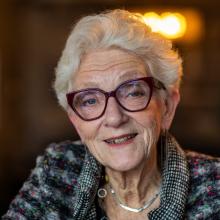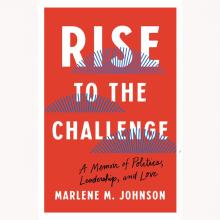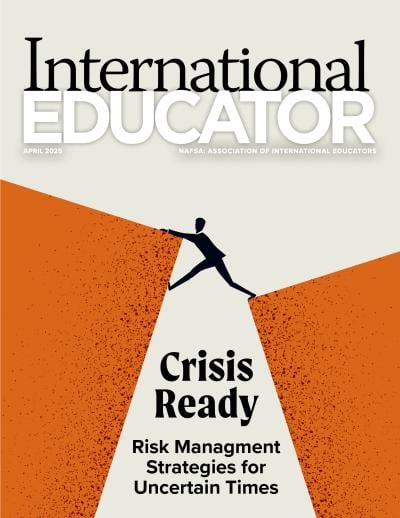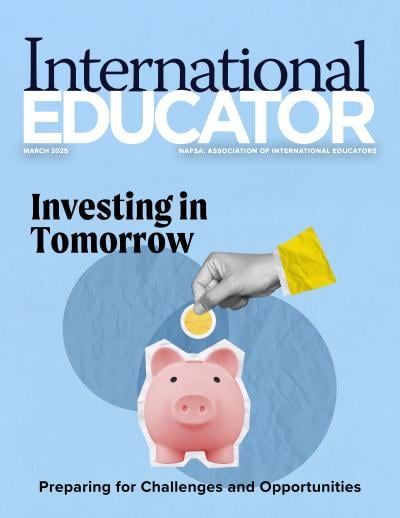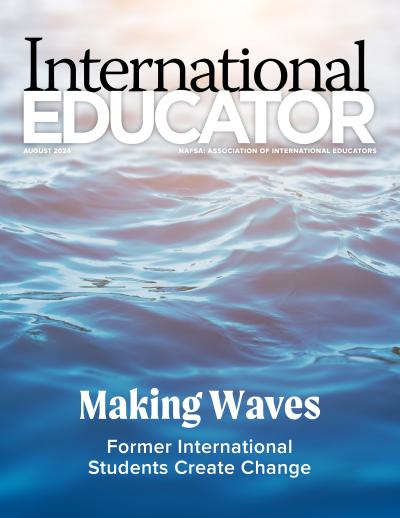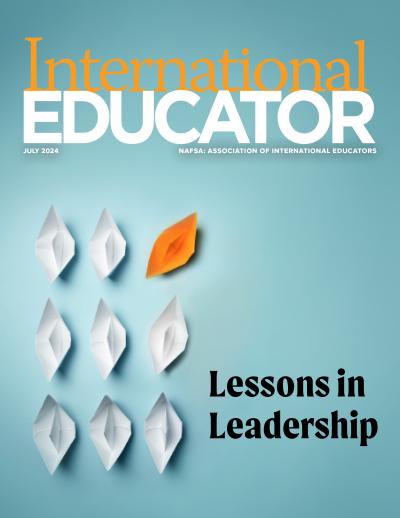Marlene Johnson: Leadership Lessons

Long before she came to NAFSA as executive director and CEO in 1997, Marlene M. Johnson was advocating for international causes. As a high schooler, she campaigned for her high school to add foreign language instruction to the curriculum. This interest in—and skills for—organizing and politics eventually led her to become Minnesota’s first woman lieutenant governor in 1993.
In her new book, Rise to the Challenge: A Memoir of Politics, Leadership, and Love, Johnson shares stories and lessons on leadership, public service, and perseverance. International Educator spoke with her about her time at the helm of NAFSA, the intersection of politics and international education, how her experience in Minnesota’s second-highest office influenced her role at NAFSA, the importance of creating a framework for policy change, and her insights on leadership.
Editor’s note: This interview has been edited and condensed for length.
Before you took the helm at NAFSA, you served as Minnesota’s first woman lieutenant governor. How did your time in that role inform your views about international education and exchange?
Actually, that role wasn’t the beginning. Growing up, as I write about in my book, my family was very engaged in international things. My half sister’s best friends from college were foreign students; they always came home to visit us on the weekends. We always had an annual United Nations dinner at our house where we all made something different and had an international meal. Then, when I was in high school, we hosted my hometown’s third AFS International student, Graham Collins, for a year. And he’s still very important in our family, and I stay in touch with him. So I came [into the role of lieutenant governor] with that background, and the administration had two public areas of focus. One was improving education. One was international trade. The obvious aspect of international education evolves from that.
How familiar were you with NAFSA before working there? What aspects of your previous roles made you interested in the position that you ended up taking at the association?
I wasn’t specifically very knowledgeable about NAFSA as an organization, but my whole life I had been part of many civic organizations. I [was involved with] the Women’s Political Caucus; I had started the Women Business Owners Association [in Minnesota]. I had been a member of the Landmark Center. My life was involved in organizations to advance things that I cared about. NAFSA was just such a perfect fit in that there was so much passion for the work among the members, and the members were at the core of making things happen. I felt very much at home there, even though I didn’t come from a university background when I came to the job.
What was the transition like for you going from more political roles to a leadership role in a nonprofit organization like NAFSA? What were some of the challenges that you faced in that transition?
I’m not saying that it wasn’t challenging at all, but I think it was more of a natural progression. I had started out as an entrepreneur, so I had a basic sense of how to lead an organization, even though that one was very small. And then in state government, I learned how to make things happen in a large organization, how to find people with common ground, and how to nurture ideas. I had done work as a board member in several nonprofit organizations, so I understood nonprofits from that side. That [experience] gave me a lot of respect for NAFSA’s Board of Directors and the role that it would play in advancing the work as well.
During my whole time at NAFSA, we had a number of international issues that were much bigger than the association but that the association had a very important role in helping talk about and develop appropriate public policy agendas for.
The main thing at NAFSA was that when I came, the board really wanted to do many new things. At the top of the list, of course, was to create more financial stability for the organization. It was also really important to the board that we establish a stronger public policy leadership role. I had some experience doing that, but Washington, [D.C.] politics were different from state government politics. During my whole time at NAFSA, we had a number of international issues that were much bigger than the association but that the association had a very important role in helping talk about and develop appropriate public policy agendas for.
What were some of the most rewarding initiatives or projects you led during your tenure at NAFSA?
The first one was articulating the rationale for why an international education policy was important for the United States. NAFSA wrote that policy proposal, and we pitched it until we got traction. It didn’t come the next day, but it did come. We got support from President Clinton because we first got support from Secretary of Education Dick Riley and Secretary of State Madeline Albright. And the two of them jointly became real advocates from two sides of town, if you could say that—from the foreign affairs side of town and from the education side of town. They were able to successfully bring it to a White House approval process. It was very tricky. It was unexpected even when it happened. But it was very exciting, and it really set the stage and helped us as we continued to advocate for other public policies in general—whether it was student immigration issues or the need for support for study abroad—having that public policy saying, ‘We believe that international education is an essential part of American foreign policy.’ That policy was adopted by the [George W.] Bush administration subsequently. And that came out of NAFSA’s work.
NAFSA wrote that policy proposal, and we pitched it until we got traction. It didn’t come the next day, but it did come.
It’s quite an accomplishment. A lot of the public policy work that NAFSA is still doing is only possible because of that initial work.
What that reminds us is the value in having a framework. It’s possible to lobby on specific issues, and it’s important to do that, of course. But the decision that we made to have a framework to guide everything else we did, I think, was very important because it has a lasting capacity, as we can see. It still drives what the organization does; it’s still there as something the State Department has looked at and owned for a long time.
There is an effort that NAFSA is jointly involved in—the U.S. for Success Coalition—to push for a national strategy for international education. How do you see that initial framework as the basis for these more recent efforts?
Whenever we work on these frameworks, there’s not a straight line for any of it. But for the period of time in which it is actively used, it changes the mindset. And there is memory among some people about that. So, in 2024, when there’s more energy around [these efforts] again, it’s not like starting from scratch. There are people in this current discussion who were there at the very beginning. People may change the role they play, but they still have it in their head—it’s still a part of who they are—and they’re still thinking and leading and providing ideas and energy for the strategic direction that NAFSA and the government want to go in and need to go in.
One of the benefits of being at an association like NAFSA is you have thousands of members whom you can leverage in advocacy efforts. How did you see the role that members could play in NAFSA’s advocacy work?
That’s one of the reasons that we created Advocacy Day, which still exists—both in terms of bringing NAFSA members to Washington, [D.C.] but also helping members learn how to engage with their members of Congress in their districts—because all NAFSA members [in the United States] have district offices, and all of those district offices have staff who are going to community meetings and who are very often very interested in learning about these kind of initiatives and meeting our members where they work at the universities. In all districts, universities are very important institutions. They’re economic drivers, they’re intellectual drivers, they provide information, they’re gathering places. The international students themselves can be really important educators in terms of helping introduce people to other cultures in the communities in which they go to school. [We wanted to] encourage our members to be engaged with their members of Congress and reach out.
Many NAFSANs remember the role that you played in bringing some real policy chops to NAFSA; it’s one of your lasting legacies for the organization.
That’s great. During the time that I was at NAFSA, there were some big issues facing the country. The Asian financial crisis; [the terrorist attacks of] September 11, 2001; and the post-9/11 time put NAFSA in a very special position. There was so much anti-Arab feeling in the country. The [George W. Bush] administration was sending students back home, and NAFSA was really the only higher education association that was willing to stand up [to that]. Eventually the others did, but immediately in the aftermath of September 11, NAFSA was the only higher education association that challenged the administration’s policy about Arab students. And we took a lot of heat for it. It wasn’t an easy time. We did a lot of media, and it was harsh. Within higher education, our members were facing a lot of pressure on their campuses because the university presidents were feeling very stressed out and were not really happy with NAFSA’s role. It was making everybody nervous. But the fact that we stood our ground and continued to stay active in that policy arena and in the immigration reform as well—that was our part to play. Our part was such a small part, but because we decided from the beginning that we needed to be involved in the whole picture in order for us to have credibility, now everybody in immigration reform knows us. And that is a lasting legacy that pays dividends for NAFSA.
But the fact that we stood our ground and continued to stay active in that policy arena and in the immigration reform as well—that was our part to play.
How has the perception of international education changed not only among policymakers but also the public over the years? And what do you see as some of the benefits to having a global education experience?
There’s more interest in studying abroad, even though there’s still so much pressure on students to compress their educational experience. There’s a question of whether or not they have time to study abroad and whether they have the money to study abroad. And I do think that money is a very important factor and that we really need to find more resources, both public and private resources, to help students with limited means study abroad. It can be a transformative experience for the individual student, and it’s also a very important experience that they bring back to whatever they do in life.
The way they do whatever they do as a career, as a contribution to their society, they will have perspectives about that work that are different because they have studied and lived abroad.
Whether people have been in the Peace Corps or they’ve studied abroad, it changes their worldview. And that means that the way they do whatever they do as a career, as a contribution to their society, they will have perspectives about that work that are different because they have studied and lived abroad. Sometimes it’s because they will learn about that culture.
And the other part of it is that when we live abroad, we learn a lot more about ourselves. It’s one of the best secrets [about studying abroad]. Because we have to explain ourselves to other people. Their questions are very often questions that we have never thought about ourselves: "Why do you do that way?" And you have to think, and it causes us to reflect. That reflection allows us to learn more about ourselves and about our own society. And that’s really a gift.
Given your extensive experience in both politics and education, how do you think the intersection of those fields will shape the future of international education in this country?
Politics is really the art of, or the practice of, building support and finding common ground. And in so many ways, so is education. It is sharing ideas, it is exploring ideas, it is challenging ideas. In a political sense, advancing those ideas is the way we affect public policy. But in an educational environment, advancing those ideas is the way we broaden our understanding of the world. It’s those well-educated people [who are doing that work]—whether we are educated in a university or whether we are educated by just engaging in a conversation that broadens our mind, we are strengthening our society. And adding the international component to it is more important than ever, because there are very few critical issues we face that don’t have an international component.
We can’t solve it just from Minnesota or Washington, [D.C.] or one country. We just can’t.
I was just reflecting on that this morning as I was reading the paper, that every other article is talking about a war or global warming or a climate condition or a wildfire or some other issue that has an international component to it. We can’t solve it just from Minnesota or Washington, [D.C.] or one country. We just can’t. We all have to be on a wavelength together and make personal decisions and personal actions, but we also have to have common conversations about it.
What personal insights did you have in writing the book that you think are the most relevant to NAFSA members?
When I started writing this book, before I had a publisher, the first conversation I had with an editor—who turned out to be my editor, but at the time he was interviewing me—he said to me, ‘I think you have two books.’ And I said, ‘I won’t write two books. I have to find a way to make this one book.’ He said, ‘Well, then you have to figure out what the threads are.’ That comment really was the driver for me as I worked on this manuscript.
And the more I worked on it, the more I realized that [during] the bookends of my life, I had some actual leadership role in which I was technically in charge. But in between those [roles], I definitely wasn’t in charge, except at NAFSA. I was just influencing, I was trying to make a case, and most of the time I was doing it with a lot of subtlety. I was learning how to influence, and I was learning how to get people to see things from another perspective. But I couldn’t cross certain lines. I needed to keep people with me so I could come back tomorrow.
All of us have leadership opportunities almost every day. Right? We just have to notice them.
When I ended up in a situation of being the caregiving support for my husband, I was even in a more critical moment of learning how to do that, because the quality of his care was basically good. But if I wanted more, I needed to be on the team, and I needed them to see me as a member of the team. I needed to not make any serious mistake that would put at risk the attention that he got because he couldn’t speak for himself.
As I wrote about this after the fact, I realized that those [experiences] were leadership—in a very different way but a very important way. And I realized that every person can do that every day. We just don’t think of ourselves like that. All of us have leadership opportunities almost every day. Right? We just have to notice them and give ourselves credit and say, ‘Okay, this is my leadership role for today. I may or may not get any credit for this, but that’s not important if I influence or if I help somebody move in a direction that I believe is important.’
That’s an interesting insight. We don’t often think of leadership in our personal lives like that, but that’s as good of an example of leadership as anything in the corporate world or government.
It was an important insight for me too, because there are times for everybody when we just feel ground down and it’s like, ‘Oh my gosh, I’m not having an impact here.’ And not every effort at leadership works, that isn’t what it’s about, but we’re still in that role, and it’s very important.
How would you describe your own leadership style?
If you ask my brothers, they would say that I’m very directive. And a friend of mine said at dinner last night, you have plenty of opinions, and you’re not afraid to share them. Those are both true. I think at the same time, I very much like to have talented people tell me what to do. The way that I worked at NAFSA is my favorite way of working. I had a really superior management team. I was able to make a decision when somebody had to make a decision, when it was my job to make a decision. That is an important skill and [one] that I have: I am willing to make a tough decision, and I don’t have to be loved all the time.
At the same time, I really love working with talented people who have different ideas than I do, and I love supporting them. I love the energy that comes with a conversation among people who have a different perspective. We talk about it together and make some decisions that are different than I would’ve made on my own or that any one of those individuals would’ve made on their own. That was really at the heart of how we worked, and that’s at the core of how I prefer to work. It’s possible when one chooses talented people.
When I made a mistake and I had to fix it, it’s the not fixing a mistake that is the real problem. I tried to never be harsh with anyone who made a mistake, because mistakes come with the territory. It means we’re just working on stuff. If we don’t make any mistakes, it means that we’re probably not doing very much. It’s only a problem if we don’t fix a mistake. A mistake is just a learning opportunity.
I love the energy that comes with a conversation among people who have a different perspective.
My husband was the master teacher at that. For me, mistakes always made me feel bad. A mistake never made him feel bad. Literally, if he spilled milk on the floor, it didn’t bother him. He just cleaned it up. The first time he saw a parent get upset with something a child had done, he said, ‘Why? Why’s that a problem?’ It wouldn’t occur to him to get upset about things that didn’t matter. That was a very important lesson for me and something I keep with me all the time, to this day. It’s one of those things you just practice. For some people like my husband, maybe there was a time when he didn’t do that, but when I knew him, he did. For me it was harder. But it is like anything else, if you practice, you ask that first question: ‘Is this really important? Is it worth getting upset?’
What else did you learn about yourself in writing this book?
That I could write. I spent most of my life believing that I could not write. And the first time I sent 50 pages of this book to a friend, the one who encouraged me to write my story about my husband, she didn’t have time to read them. She said, ‘Well, I’ll speed read 10 pages.’ But then she ended up reading the whole thing because she got interested. And in her email to me, she said, ‘You’re a terrific writer. This is a great story, but you have to write the whole thing because otherwise this piece doesn’t make sense.’ And when she said those words to me, I can still recall the physical departure of all that self-doubt I was carrying in my body. It just left. And I started enjoying the writing. I can honestly say for the year and a half that I worked on this, I enjoyed every day. I mean, it was exhausting. Some days I could only write one hour. Then I’d get up the next day and write for two or three hours; you know, it just didn’t matter. But I wrote six days a week, pretty much, for a year and a half.
What do you hope people are left with when they finish this book?
I hope people find it an interesting read, and I hope people see something of themselves in terms of leadership opportunities and personal insights. I hope they find it a good story. •
Additional Resources
About International Educator
International Educator is NAFSA’s flagship publication and has been published continually since 1990. As a record of the association and the field of international education, IE includes articles on a variety of topics, trends, and issues facing NAFSA members and their work.
From in-depth features to interviews with thought leaders and columns tailored to NAFSA’s knowledge communities, IE provides must-read context and analysis to those working around the globe to advance international education and exchange.
About NAFSA
NAFSA: Association of International Educators is the world's largest nonprofit association dedicated to international education and exchange. NAFSA serves the needs of more than 10,000 members and international educators worldwide at more than 3,500 institutions, in over 150 countries.
NAFSA membership provides you with unmatched access to best-in-class programs, critical updates, and resources to professionalize your practice. Members gain unrivaled opportunities to partner with experienced international education leaders.


